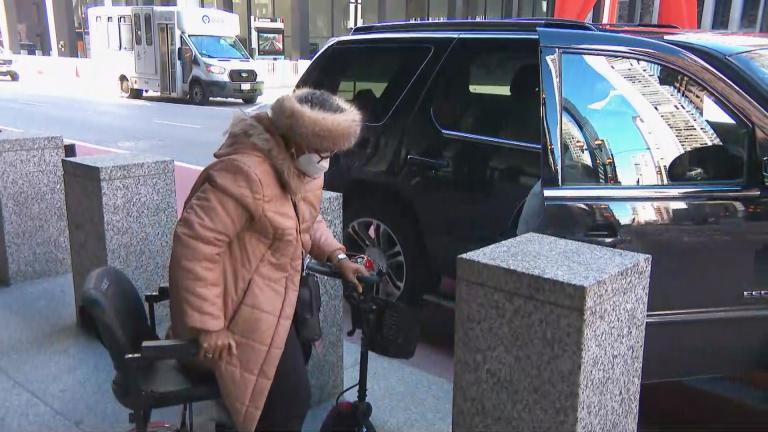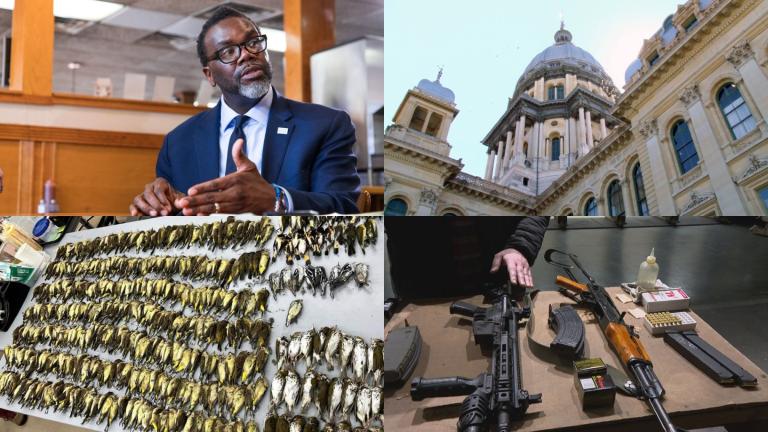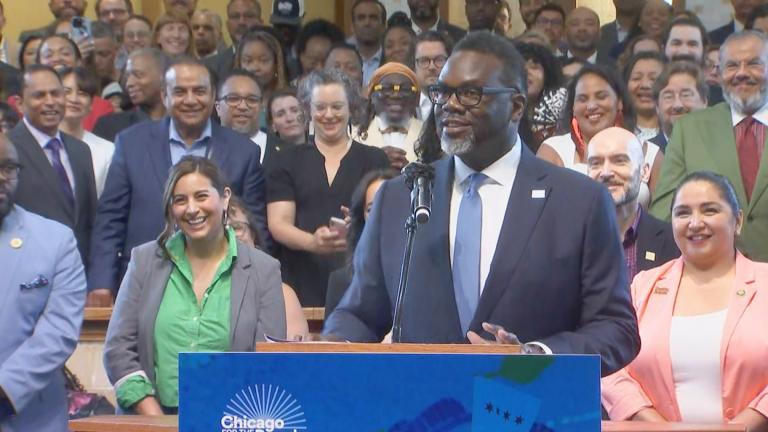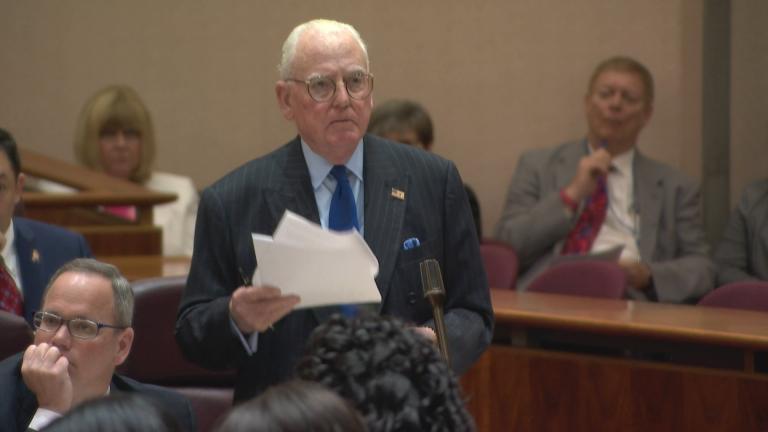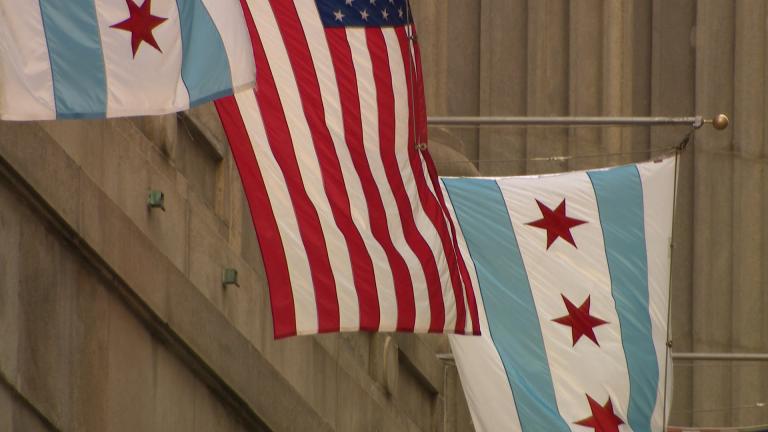Video: The WTTW News Spotlight Politics team previews the Chicago mayoral election on the eve on Election Day. (Produced by Alexandra Silets)
Chicago voters will head to the polls Tuesday to pick not just a mayor but also to chart a new course for a city struggling to emerge from the aftermath of the COVID-19 pandemic’s peak and to cope with a surge in crime, amid unfulfilled demands for racial justice and economic equity.
Voters in 14 wards will also elect a new alderperson to the Chicago City Council, capping a significant transformation fueled by an unprecedented exodus that has already seen several moderate veterans replaced by younger and more progressive members.
The outcome of the race to replace Mayor Lori Lightfoot and become Chicago’s 57th mayor pits former Chicago Public Schools CEO Paul Vallas against Cook County Commissioner Brandon Johnson, and is likely to serve as a referendum on public safety, with the rivals offering wildly different solutions to the seemingly intractable problem.
Campaigning with the support of the Fraternal Order of Police, Lodge 7, Vallas has vowed to fill many of the vacant positions in the police department as quickly as possible, while redeploying officers as part of a community policing strategy that ensures they patrol the same area of the city regularly while working a regular schedule.
While promising to implement reforms required as part of a federal court order, Vallas has said his approach to public safety would center on efforts to reverse rules that have “literally handcuffed” officers, “demoralizing” them and making “proactive policing” impossible.
During the runoff campaign, Vallas has sought to distance himself from those remarks, and condemned police union President John Catanzara for telling the New York Times that between 800 and 1,000 police officers will resign if Johnson wins, leading to “blood in the streets.”
WTTW 2023 Chicago Election Voter Guide
Johnson has promised to take a more “holistic” approach to public safety by addressing the root causes of crime and violence.
Johnson proposed increasing funding for youth employment programs and mental health services, and vowed to redirect $150 million within the police department's budget, including an additional $50 million to fund reform efforts and comply with the court-ordered reforms.
Johnson has also vowed to expand the Chicago Police Department’s detective ranks by promoting 200 officers and task them with solving crimes, including murders and disappearances.
Johnson backs the “treatment not trauma” plan authored by Ald. Rossana Rodriguez Sanchez (33rd Ward) that calls for publicly run mental health clinics to be reopened and for social workers, not police officers, to respond to 911 calls for help from those experiencing a mental health crisis.
Johnson also authored a nonbinding resolution in the summer of 2020 that called for county officials to “redirect funds from policing and incarceration to public services not administered by law enforcement that promote community health and safety equitably” after the police murder of George Floyd touched off a wave of social justice protests and unrest.
After finishing second in the first round of voting, Johnson has promised not to cut “one penny” from the $1.94 billion budget of the Chicago Police Department, and has declined to endorse calls to reduce funding for the scandal-plagued department.
The two candidates have also clashed over school policy, making the results of the contest a referendum between the Chicago Teachers Union – where Johnson works as an organizer and the largest contributor to his campaign – and those who want to expand the number of charter schools.
Vallas is a longtime supporter of efforts to expand charter schools and backs programs that use public funds to pay tuition at private schools. Vallas’ education platform vows to lift the cap on enrollment in “high-performing charters,” favors allowing charter schools to locate in empty or near-empty public school buildings if “they serve neighborhood children” and backs programs that use public funds to pay tuition at private schools, according to his website.
A statewide advocacy organization designed to promote charter schools reported spending more than $775,000 to oppose Johnson’s campaign and support Vallas, according records filed with the Illinois State Board of Elections filed by the INCS Action Independent Committee, which is funded by the Illinois Network for Charter Schools.
City Council Control Up for Grabs
While most progressive political organizations are backing Johnson in mayoral race, they are also working to remake the Chicago City Council after a wave of retirements and departures by veteran alderpeople.
Nearly a quarter of the city will get new political leadership in 2023, putting control of the City Council up for grabs as residents of 14 wards where no candidate got more than 50% of the vote head to the polls.
- 4th Ward: Lamont Robinson v. Prentice Butler
- 5th Ward: Desmon Yancy v. Martina Hone
- 6th Ward: William Hall v. Richard Wooten
- 10th Ward: Peter Chico v. Ana Guajardo
- 11th Ward: Nicole Lee v. Anthony Ciaravino
- 21st Ward: Ronnie Mosley v. Cornell Dantzler
- 24th Ward: Monique Scott v. Creative Scott
- 29th Ward: Chris Taliaferro v. CB Johnson
- 30th Ward: Jessica Gutiérrez v. Ruth Cruz
- 36th Ward: Gilbert Villegas v. Lori Torres Whitt
- 43rd Ward: Timmy Knudsen v. Brian Comer
- 45th Ward: Jim Gardiner v. Megan Mathias
- 46th Ward: Angela Clay v. Kim Walz
- 48th Ward: Leni Manaa-Hoppenworth v. Joe Dunne.
Polls open at 6 a.m. Tuesday and are scheduled to close at 7 p.m. Voters in line when the polls close will be allowed to vote. More than 195,000 votes were cast by mail and during the early voting period that began March 20 and ended Monday, according to data released by the Chicago Board of Election Commissioners.
Voters can cast a ballot at their assigned precinct polling place on Tuesday, or head to an early voting location in each of Chicago’s 50 wards, which will remain open as vote centers on Tuesday, officials said. Voters can also go to the Chicago Board of Election Commissioners supersite at 191 N. Clark St.
Completed mail ballots can be dropped off on Election Day at any of the vote centers or the board’s office at 69 W. Washington St., 6th floor.
Mail ballots must be postmarked no later than Tuesday and arrive by April 18 to be counted, officials said.
Those who have received a mail ballot but wish to vote in person should take the ballot they got in the mail to any early voting site or their precinct polling place and surrender it to an election judge. They will then be issued a new ballot, officials said.
Mail ballots received by Monday will be counted on Tuesday, and included in results reported after polls are scheduled to close at 7 p.m., officials said.
More: WTTW News Explains: What Happens to Your Ballot After You Vote?
The election is the first to reflect the ward map drawn by members of the City Council to reflect the results of the 2023 census.
Chicagoans can register to vote, or update their name or address, and cast a ballot on Election Day at any early voting location or precinct polling place, as long as they have two forms of government-issued identification, one of which shows the voter’s current address, officials said.
Contact Heather Cherone: @HeatherCherone | (773) 569-1863 | [email protected]

